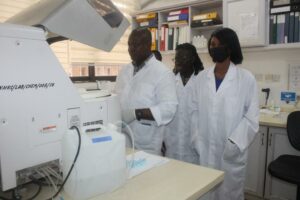Blend conventional and traditional medicine to help mental patients – Researcher

Mr. Kenneth Ae-Ngibise, a research fellow at the Kintampo Health Research Centre (KHRC) said that it makes sense to blend conventional and traditional medicines to provide comprehensive care for mental patients.
According to him, some people avoid health facilities and seek treatment directly from traditional and faith healers and it is therefore important that in rolling out programmes, the mental health sector finds an interface between orthodox medicine and traditional medicine to address the needs of this group of patients.
Mr. Ae-Ngibise said these during an interaction with journalists at Kintampo in the Bono region, who were on a visit to the KHRC.
He was explaining the details of a study carried out by the KHRC on the implementation of the Mental Health Act in Ghana: Barriers and enablers using a mixed method.
The visit by the journalists formed part of the commemoration of this year’s World Malaria Day celebration and it was organized by the African Media and Malaria Research Network (AMMREN) in collaboration with the KHRC.
Mr. Ae-Ngibise said the objectives of the study on mental health, which he led, was targeted at investigating the barriers and enablers for implementing the 2012 Mental Health Act in Ghana.
He mentioned some of the barriers to mental health care as constraints with the national health budget, lack of political will and stigmatization. He said these are some of the reasons why mental health care is not at the top of the agenda when dealing with other health conditions. He added that there is the need to regulate some bad practices when providing care for mental patients who are usually taken to all sorts of places to seek care.
According to him, depression which is a common mental health condition could be traced to poverty and work-related stress among others.
Earlier, interacting with the journalists, Dr. Kwaku Poku Asante, Director of the KHRC, said the KHRC established in 1994, has been involved in a number of malaria studies and it has helped in shaping policies to guide the country in moving from the use of chloroquine to ACTs for malaria treatment.
The centre has also trained over a thousand microcopists who are helping in accurate malaria diagnosis. In 2020, it worked with the National Malaria Control Programme to monitor malaria prevalence in the Greater Accra region with findings showing that places such as the Krowor, La Dade Kotopon and Ladzekuku have very low malaria prevalence rate with some of the highest rates in Ada East and Ga West.
Dr. Poku Asante said some of the challenges facing the centre in their research work is the competitive funding environment for health research in this era of the COVID-19 pandemic.
He said the KHRC is an internationally recognized institution for health research and their work has informed policy.
Dr. Charity Binka, Executive Secretary of AMMREN, noted that the media has a critical role to share information on health issues to the public because the public depends on the media to sometimes make informed decisions and choices.
By Eunice Menka
Copyright ©2022 by NewsBridge Africa
All rights reserved. This article or any portion thereof may not be reproduced or used in any manner whatsoever without the express written permission of the publisher except for the use of brief quotations in reviews.
